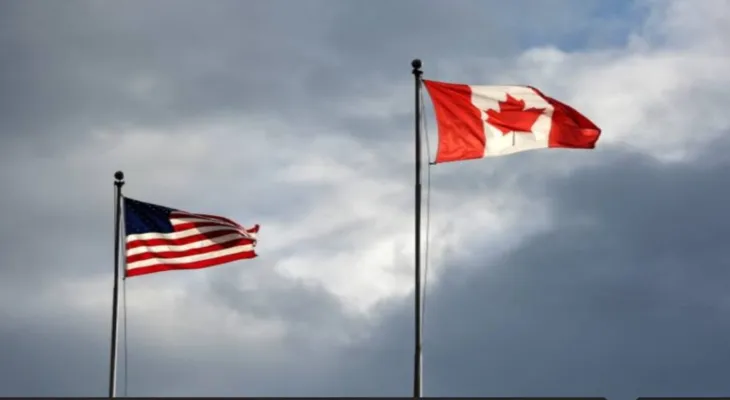Search here
Newspaper
Search here

Arab Canada News
News

Published: February 17, 2025
Washington – Toronto | President Donald Trump's remarks about the possibility of annexing Canada to the United States have sparked widespread controversy at both the political and popular levels, after he described Canadian Prime Minister Justin Trudeau as a “governor” of Canada, suggesting that the country could become the 51st U.S. state, in light of what he termed “its need for American protection.”
From a Joke to a Serious Threat
The controversy began last November, when Justin Trudeau visited Trump at his Mar-a-Lago resort following the latter's victory in the U.S. presidential elections, where the newly elected president proposed the idea of Canada becoming part of the United States. In an interview with MSNBC, Trudeau revealed that he tried to engage with the idea humorously, suggesting swapping Vermont or California with Canada, but noted that Trump did not find it funny and quickly moved on to another topic.
However, these remarks, which seemed like mere jokes at the time, returned in a more serious light after Trump returned to the White House. Financial Times reporters Miles McCormick (Washington) and Ilya Gridnev (Toronto) reported that Trudeau's tone towards this proposition changed completely just one month after Trump's return to power, reflecting an escalation in the seriousness of American discourse on this issue.
Last week, Trudeau was heard in an informal conversation, picked up by a microphone he did not know was on, admitting that "Trump's annexation threats are real," indicating that the U.S. administration has plans to exploit Canadian natural resources.
Escalation in American Discourse
In a new escalation, Trump stated on Thursday that Canada could be “a serious competitor to become the 51st U.S. state.” He added that “Canadians need the protection of the United States,” which led analysts to question the seriousness of these statements and whether they could be part of a larger political strategy.
Geopolitical Strategy or Political Maneuvering?
Steve Bannon, Trump’s former advisor, indicated that these remarks are not just a joke but come as part of a broader strategic vision aimed at enhancing American dominance in the Arctic. He explained that discussions about annexing Canada are also linked to Washington's plans to control Greenland and the Panama Canal, in the context of geopolitical competition with China and Russia over polar resources.
Bannon said: “Trump has previously asserted that the new Great Game of the 21st century revolves around the Arctic, where great powers compete for influence and control over mineral and energy resources there.”
However, Elliot Abrams, the former special representative of the Trump administration in Venezuela and Iran, warned that such statements could lead to a deterioration of relations between Washington and Ottawa. Nevertheless, he confirmed that Trump has “strong convictions” about this issue, which may indicate a potential for real pressure on Canada in the future.
Strong Canadian Reactions: A National Campaign Against Annexation
Within Canada, these statements sparked a wave of nationalism, as many called for supporting local products and reducing economic reliance on the United States. The country also saw the cancellation of many trips to the United States as a form of protest, amid growing concerns about the intentions of the Trump administration towards Ottawa.
As for Trudeau, he sought to calm the situation and reassure Canadians, asserting that the scenario of Canada being annexed to the United States is “entirely out of the question.” In media statements, he said: “There is no chance of this scheme succeeding, just as there is no chance for a snowball to survive in hell,” referring to the impossibility of this happening politically or legally.
Political Analysis: A Negotiation Tactic or Provocation for Trudeau?
Experts believe that these statements could be part of a negotiating strategy employed by Trump, where he adopts shocking positions to attract attention and gain leverage in any future talks.
Kevin Madden, a senior partner at Penta Consulting and a former advisor to presidential candidate Mitt Romney, said: “The mockery of the idea of the 51st state ensures that Trump’s position dominates the headlines, making it difficult for his opponents or negotiating rivals to make any progress against his agenda.”
For their part, Canadian analysts see that Trump is trying to exploit Trudeau's fragile political situation, who is preparing to leave office in March. Some observers believe that the U.S. president seeks to provoke the Canadian government and weaken its political position ahead of any new negotiations between the two countries.
Conclusion
In light of this escalation in political discourse between Washington and Ottawa, the question remains: Are Trump's remarks merely a negotiating tactic to gain leverage in any future talks, or do they reflect a long-term strategic direction aimed at reshaping the geopolitical landscape in North America?
The coming days will reveal more about the intentions of the Trump administration, but it is clear that U.S.-Canadian relations are undergoing an unprecedented phase of tension, which may impact economic and political cooperation between the two neighbors in the near future.
Comments